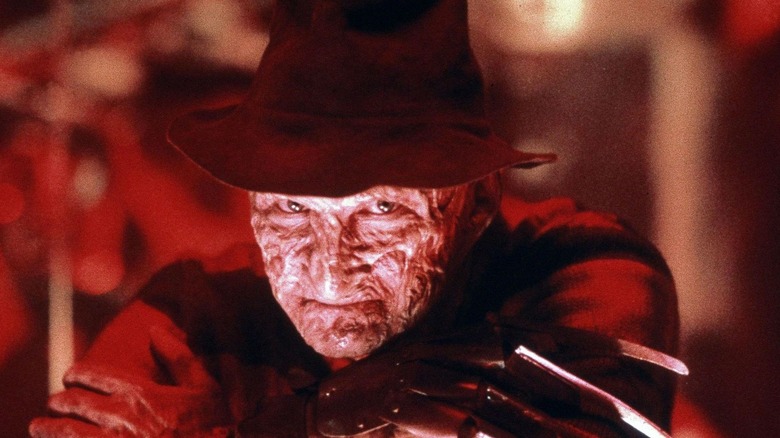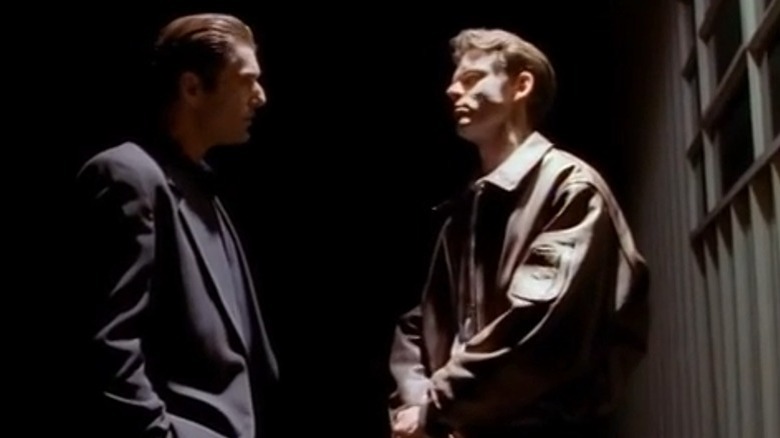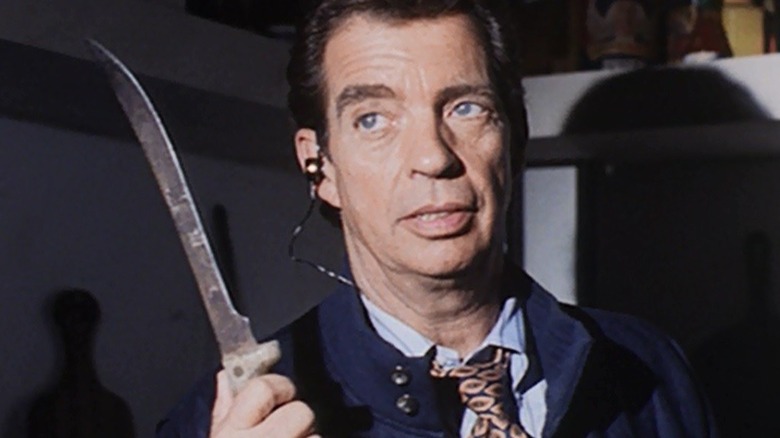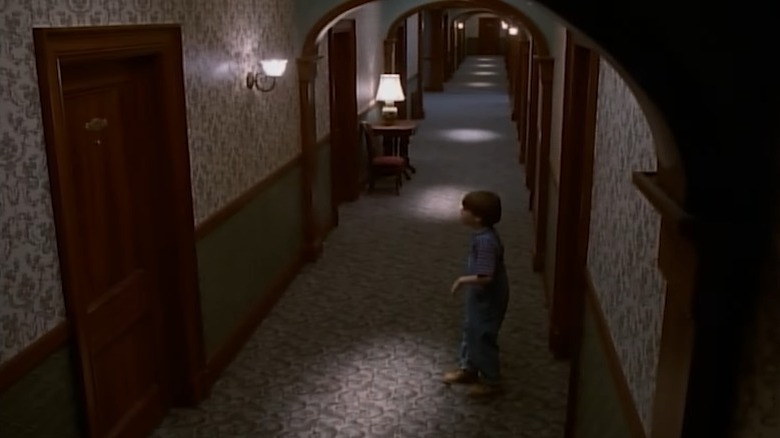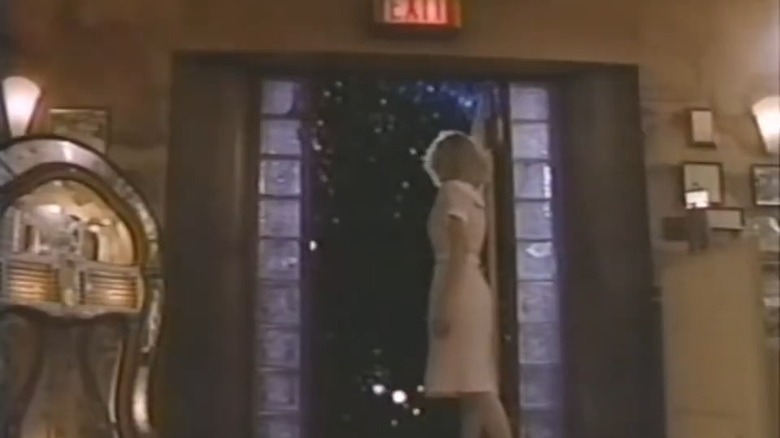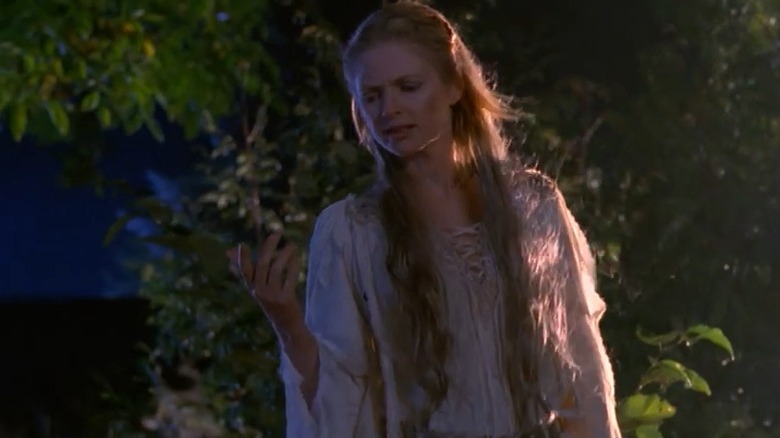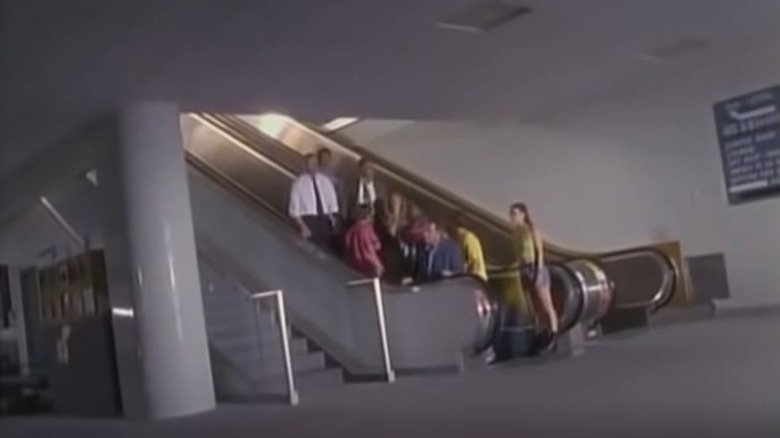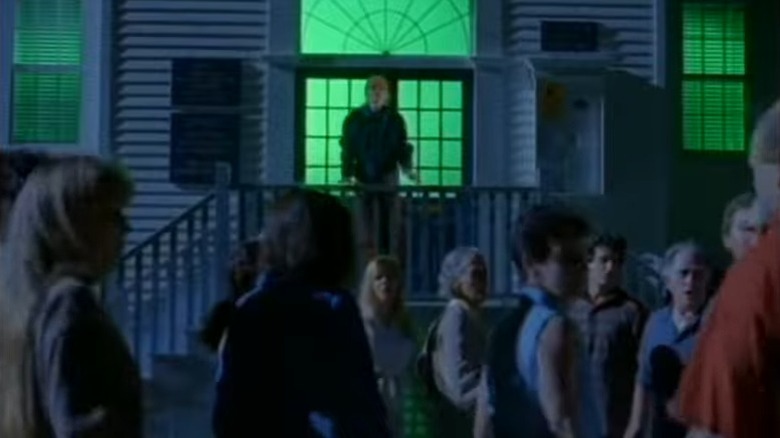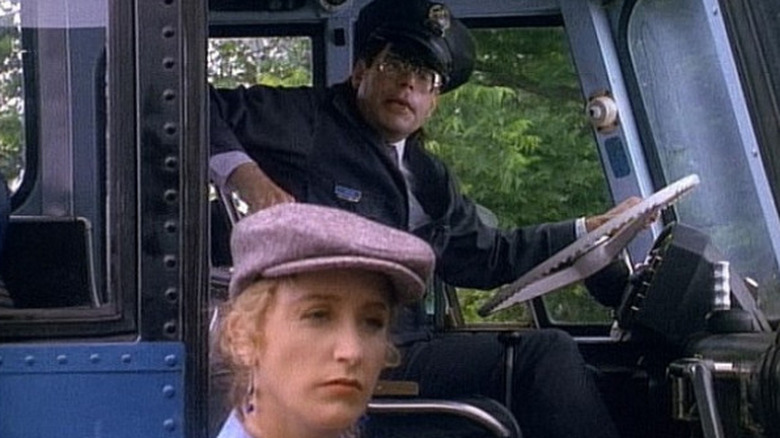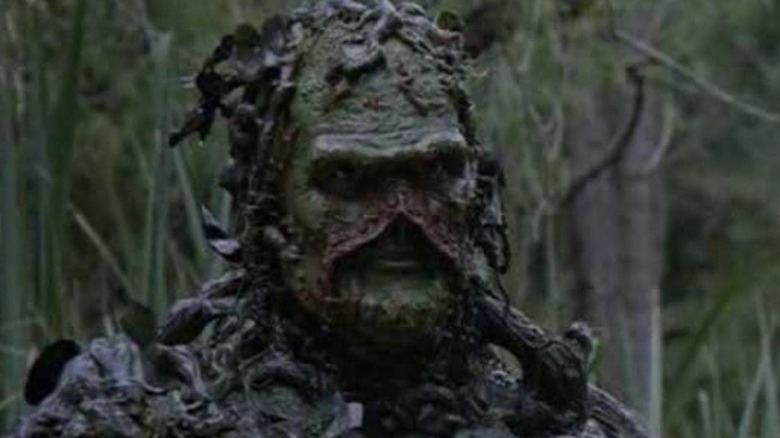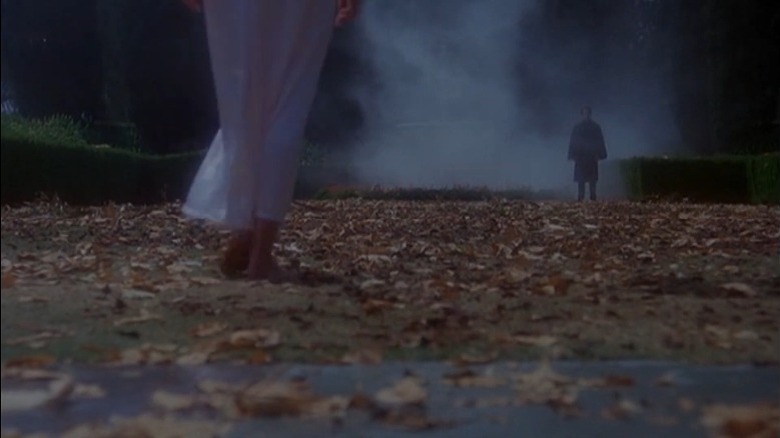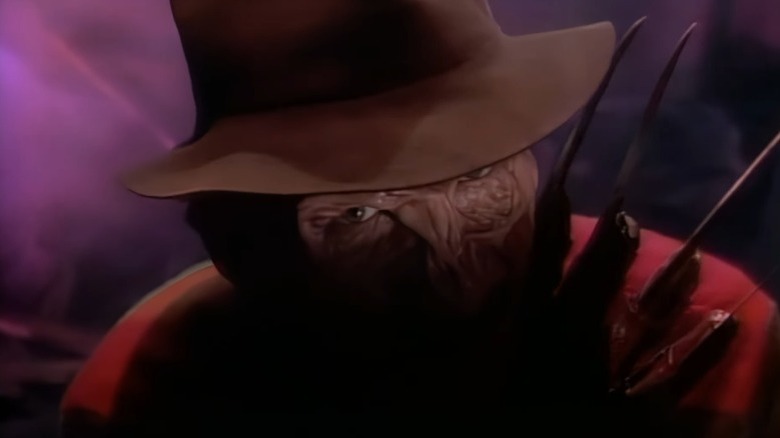90s Horror TV Shows With Awful Reviews That Are Actually Worth Watching
It's no secret to any horror buff that the genre's greatest offerings aren't always defined by critical prestige. But when it comes to horror television, the uphill battle that new shows face to overcome skepticism and garner positive reviews is even steeper. This is aptly demonstrated by the TV landscape of the '90s, in which writers and directors galvanized the medium by venturing into as-yet-unexplored depths of scariness, violence, and production value. However, creators weren't always able to translate that broadening of horizons into favorable critical notes.
Sure, it was the decade of "Twin Peaks," "The X-Files," Stephen King's "It," and all the bold new offerings for which such beloved programs paved the way by evidencing audiences' appetite for serious, well-made horror TV. But it was also the decade of a vast number of critical flops, which have been either largely forgotten or marred by extremely negative reputations over the decades — with exception made to the few that transcended the pans and became audience hits nonetheless.
Even among the most reviled, however, it's possible to find a good number of underrated gems, which can offer plenty of pleasures to those willing to get past their old-fashioned, pre-Golden Age of TV vibes and significant visual effects limitations. We've rounded up some horror series from the '90s that received scathing reviews, yet are very much worth your time — including two primetime vampire dramas, two comic book adaptations, two Stephen King-scripted miniseries, two shows starring Robert Englund, and one classic '80s horror spin-off (in name only).
Kindred: The Embraced
While "network TV series based on a tabletop RPG" may sound like the most '90s-y description for a TV show ever, Fox's "Kindred: The Embraced" actually broke new ground in 1996 as the first mainstream, adult-oriented screen adaptation of a roleplaying game. Along with CBS and USA Network's "Forever Knight," it also pioneered the concept of urban, gritty, contemporary-set vampire television, preceding iconic shows like Joss Whedon's "Buffy the Vampire Slayer," "True Blood," and "The Vampire Diaries." But even all that freshness wasn't enough to keep "Kindred" from being largely dismissed by critics. It's a shame, because it was truly a show that deserved a better shake — both from reviewers and from audiences, whose disinterest led to a premature cancellation after a single, eight-episode season.
Created by John Leekley and Mark Rein-Hagen, "Kindred" follows the mythology and dynamics of Rein-Hagen's 1991 game "Vampire: The Masquerade" pretty closely, using a straightforward police procedural hook as the mere entry point into a sprawling world of vampire clans perpetually on the brink of conflict. Mark Frankel stars as Julian Luna, a kind of vampire Don Corleone, whose apparent life as a mobster is actually a cover for his role as the Prince of the Kindred, an aggregation of five rival San Francisco clans, which Julian is tasked with overseeing and keeping in balance. Although the cop show elements centered around Detective Frank Kohanek (C. Thomas Howell) are mostly boilerplate, everything involving the vampires themselves is deeply engrossing, chilling, and fun.
Tales from the Crypt
Sure, it's a classic now and even inspired a since-dead attempt at an M. Night Shyamalan-penned reboot, but HBO's "Tales from the Crypt" was actually met with rather derisive reviews during its original run, as attested by the paltry score of 52 given to the first season on Metacritic. Still, it's an absolute must-watch for any self-respecting fan of the horror genre and the singular shapes it can take in the television medium — not least because it actually rewrote the rules for horror TV.
Generally speaking, HBO helped push all of American television forward by eschewing the standards and practices of broadcast and basic cable networks, allowing for content that was as unbound and uncensored in its content as the most outré of art films. But "Tales from the Crypt," an adaptation of the eponymous comic anthology series by William Gaines and Al Feldstein, was the first HBO series to utilize that freedom in the name of scariness.
In the 93 episodes aired between 1989 and 1996, gone were the modesty and discretion of previous TV forays into horror, and in their place came gruesome violence, liberal nudity, intense sexual content, and a shockingly dark and twisted vision of late-20th-century American society. Not that the scandalousness was all the show had going for it, mind you; in 30-minute mini-films ranging from taut slashers to psychological freakouts to bizarre scientific what-ifs, it displayed the best of what the horror genre can offer, even in a limited timeframe.
The Shining (1997)
Stephen King hated Stanley Kubrick's adaptation of "The Shining," as he has reiterated several times throughout the years. To give one example, he told Playboy Magazine in 1983 that "for all its virtuoso effects, [the film] never gets you by the throat and hangs on the way real horror should" (via The Dissolve). In fact, Kubrick's film bugged King so much that, in 1997, he went ahead and developed his own adaptation of "The Shining," in the form of a three-episode ABC miniseries. In sharp contrast to the hands-off approach he took to the original adaptation of "It," King intended his "The Shining" as a book-faithful corrective to Kubrick's. Critics, in turn, widely criticized the series as a less memorable version of the story.
To be fair, the King-penned, Mick Garris-directed series is not, indeed, an avant-garde masterpiece on par with the 1980 film. But it does deserve a better reputation than it's got. Although the visual effects are about as dated as you'd expect of a 1997 network TV show, ABC's "The Shining" is genuinely engaging and spine-tingling as a more straightforward and character-driven meditation on the emotional troubles of a nuclear family isolated to the point of madness. Steven Weber and Rebecca De Mornay's performances alone are worth watching for the fascinating way they re-contextualize the characters of Jack and Wendy Torrance, and the same goes for many of King's and Garris' choices, which approach the novel primarily on its own terms as a narrative piece.
Nightmare Cafe
In the horror filmmaking career Wes Craven accidentally fell into, few achievements stand taller than the Robert Englund-starring "Nightmare on Elm Street" series. Yet Craven and Englund's enduring creative partnership wasn't just limited to that one franchise. One of the many non-Freddy Krueger roles that Englund has tackled over the course of his 50-year film and TV career was Blackie, the mysterious establishment owner at the center of Craven's short-lived 1992 series "Nightmare Cafe."
Created by Craven and Thomas Baum, "Nightmare Cafe" could be described as an earnest foray into sci-fi by the prolific horror auteur, but it could not exactly be described as commercially successful. Despite the pedigree behind and in front of the camera, NBC canceled the series after just six episodes. Critics weren't too hot on it, either; reviewing it in February 1992 for Variety, Roberta Bernstein wrote, "Poorly conceived, badly acted and inanely written, this effort at supernatural suspense by exec producer Wes Craven fails miserably."
Still, "Nightmare Cafe" is every bit as interesting and full of personality as any of Craven's work. Telling the story of a sentient cafe that vaults through space and time and draws in people hoping for a second chance in life, as well as the employees it catapults into various misadventures, it's a blend of fantasy and horror shot through with a hefty dose of time-bending existentialism. Even at an unfortunately abbreviated episode count, it's perfect cozy/creepy viewing for nostalgic evenings.
Poltergeist: The Legacy
Although bearing little relation to the "Poltergeist" film franchise, aside from the title and the general concept of centering around paranormal phenomena, "Poltergeist: The Legacy" scratches a similar itch to the notorious 1980s trilogy about a family pestered by ghosts. With a case-of-the-week structure that doesn't take away from its intensity and urgency one bit, the Richard Barton Lewis-created series — which aired for three seasons on Showtime before hopping on over to Sci-Fi Channel for a fourth and final outing — is among the most consistently frightening shows of the '90s.
Despite that quality and the audience success that reflected it, however, "Poltergeist: The Legacy" was shunned by critics, who didn't view its repurposing of "Poltergeist" into a procedural format too favorably. Even so, the show is entirely satisfying and compelling if you can get past the fact that it's essentially "Poltergeist" in name and spirit (no pun intended) only. The subtitle refers to the Legacy, a secret society with chapters all around the world, in which paranormal specialists are tasked with keeping tabs on the relationship between our world and the beyond, and routinely step in to help when humans are threatened by ghostly forces. "Legacy" specifically follows the San Francisco chapter, which disguises itself as an archaeological foundation; on each episode, its diverse team of experts led by Dr. Derek Rayne (Derek de Lint) works together to solve new mysteries, save civilians, and help the uninformed navigate the tricky and dangerous workings of the supernatural world.
The Langoliers
American actor and director Tom Holland — no relation to the 27-year-old British "Spider-Man" franchise actor of the same name — was behind the making of some of the most notable horror films of the '80s and '90s, writing the screenplay for "Psycho II" and both writing and directing the original "Fright Night" and "Child's Play" films. This expertise came to serve Holland well when he was tasked with writing and directing a two-part miniseries adaptation of the Stephen King novella "The Langoliers." Indeed, despite a very mixed reception by critics, the ABC-broadcast "The Langoliers" is among the stronger King-based TV productions of a period rife with them; it even features the author himself in one of his many cameos.
Like many King stories, "The Langoliers" is centered around a group of strangers who find themselves bound together by an unexpected brush with the supernatural. A late night flight from Los Angeles to Boston passes through an eerie light in the sky, causing all awake passengers to vanish into thin air, while the sleeping ones — thankfully including a deadheading pilot (David Morse) — are left behind to figure out what's going on. They land their plane in a Maine (where else?) airport which turns out to be mysteriously deserted, and soon encounter a band of voracious creatures that feed on time. Told in two 90-minute parts, the miniseries brings King's novella to vivid life, deeply exploring its psychological nuances as well as its heady temporal paradoxes and cheesy yet efficient scares. It may not be one of the best Stephen King miniseries adaptations out there, but it's still worth watching.
The Tommyknockers
Speaking of Stephen King adaptations, ABC also ventured into that veritable horror subgenre a couple of years before "The Langoliers," with a two-part audiovisual rendering of the 1987 sci-fi novel "The Tommyknockers." With a script by Lawrence D. Cohen and direction by John Power, the 1993 "Tommyknockers" miniseries was absolutely slaughtered by critics, who took issue with everything from the writing to the visual effects to the source material itself. Even King, ever the mensch when it comes to adaptations of his work, has made rare negative remarks on "The Tommyknockers" — both the TV production and, in a 2014 Rolling Stone interview, his own novel, which he deemed "an awful book."
Although "The Tommyknockers" is, indeed, not one of the out-and-out best King-based TV shows, it's still very much worth the time of King completists and sci-fi horror aficionados alike. The structure is coolly effective: The first half shows the residents of Haven, Maine being slowly affected by an inexplicable alien artifact being dug up from the ground by Bobbi Anderson (Marg Helgenberger) and Jim "Gard" Gardner (Jimmy Smits), which turns regular citizens into genius inventors overnight. Then, the second half delves into the precise nature of the force that's possessing the town, revealing its extraterrestrial origins and the imminent existential threat it poses to the whole of Haven. Low-budget effects notwithstanding, it's the perfect two-act setup for a classic King tale of quiet small town tranquility being disrupted by horrors beyond anyone's understanding.
Stephen King's Golden Years
In a rare example of a "Stephen King miniseries" that was literally a Stephen King miniseries – as in, one created as such by the man himself — CBS aired the seven-part "Stephen King's Golden Years" in 1991. Described by King as a "novel for television" (via The New York Times), "Golden Years" was born from the "Twin Peaks"-prompted realization that American audiences were ready for continuity-driven television series that moved beyond the soap opera template.
Many critics argued that "Golden Years" fell flat on its face as a "Twin Peaks" riff. Empire's William Thomas said, "Draggily directed, blandly acted and without much in the way of horror," while Baltimore Sun's Michael Hill offered King a simple piece of advice, "Stick with novels, Stevie, baby." But the show is eminently interesting, one might even argue essential, as a pioneering glimpse into the way King's mind operates outside of the literary format. It contains a typical Kingian hook: The elderly Harlan Williams (Keith Szarabajka), a janitor working in a secret army laboratory, falls victim to an explosion that doesn't kill him yet causes him to start aging in reverse. The slower first few episodes contain a lot of table-setting and character-building, but "Golden Years" eventually takes off into a frenetic combo of conspiracy thriller, existential horror, and loopy sci-fi that showcases King's command of storytelling in a different way from his work born on the page.
Swamp Thing (1990)
Len Wein and Bernie Wrightson's Swamp Thing has always been unique among the pantheon of iconic superheroes for his proximity to the horror genre; the best Swamp Thing stories strike a tone incomparably perched between dread and comfort, counterintuitively twisting the nightmarish despondency of its premise into a foundation for unwavering moral righteousness. The two "Swamp Thing" films released in the 1980s, alas, did not quite capture that tonal singularity, instead opting for a goofier, broader approach.
Enter USA Network's "Swamp Thing," which endeavored to course-correct by giving the character a more serious, more thematically fleshed-out treatment. Developed by Joseph Stefano, famous for writing the screenplay for "Psycho" — yes, Alfred Hitchcock's original, controversial 1960 "Psycho" — and many episodes of "The Outer Limits," the 1990 series offered a similarly high-minded yet thrill-attentive outlook on the most tortured yet principled of DC Comics heroes. It wasn't enough to keep it from being ravaged by critics, mind you, but any Swamp Thing fans should find plenty to love in Stefano's vision.
Instead of big weekly fights and elaborate setpieces, the show explores the complex interplay between humanity and nature that takes place in the titular Louisiana swamp, showcasing Swamp Thing (aka Alec Holland) and his unusual moral code and stringent commitment to preserving life and combating those intent on destroying it for personal gain. Which isn't to say that there aren't also plenty of good scares and satisfying swamp action to go around; this time, though, they're balanced with genuine narrative interest.
Dark Shadows (1991)
The original iteration of "Dark Shadows," which aired on ABC between 1966 and 1971, revolutionized the world of soap operas by marrying the format to a Gothic sensibility that turned out to suit it to a T. Decades later, before Tim Burton and Johnny Depp ever tried to resurrect the series on the big screen, NBC enlisted original creator Dan Curtis to reboot "Dark Shadows," this time as a leaner and loftier primetime soap.
The 1991 "Dark Shadows" cultivated a strong following but faltered in the ratings, leading to a premature cancellation that was protested by thousands of fans via calls, letters, and even pickets. Critics, meanwhile, weren't particularly fazed, as their reception to the freshman series had been decidedly less enthusiastic.
Anyone who's into Gothic horror owes it to themselves to see what all the fuss is about. Like the original, the primetime-bound "Dark Shadows" tells of the supernatural goings-on at the Collinwood mansion in Collinsport, Maine, where the Collins family is dealing with the emergence of vampire patriarch Barnabas Collins (Ben Cross) from the coffin where he'd been buried for two centuries. Much of the show unfolds from the perspective of new governess Victoria Winters (Joanna Going), who eventually travels back in time to 1790 and meets a new cast of Collins family members and associates played by the same actors as the 1991 timeline. Eerie, morbid, emotional, and much more propulsive than the daytime soap version, this "Dark Shadows" is a major precursor to every horror-fantasy-romance show that stirred Tumblr turmoil in the 21st century.
Freddy's Nightmares
Have you seen the "Nightmare on Elm Street" installment directed by "The Texas Chain Saw Massacre" filmmaker Tobe Hooper? If not, don't fret, because a great number of horror aficionados aren't even aware that the legendary American filmmaker once had a dalliance with the Wes Craven-created franchise. But sure enough, the "Elm Street" spin-off anthology series "Freddy's Nightmares," which aired two seasons in syndication between 1988 and 1990, brought on Hooper as the director of its pilot episode.
That episode, incidentally, is among the few actually centered on Freddy Krueger (Robert Englund). Although Englund appears in every episode, most installments feature Krueger only as an announcer, introducing myriad horror stories set amid the desolation of Springwood, Ohio. The stories incorporate a wide variety of supernatural elements, jumping freely from concept to concept with each new episode; some, like the Hooper-directed opener, are de-facto "Nightmare on Elm Street" sequels featuring Krueger as a primary villain.
None of the episodes are written or directed by Wes Craven himself, whose role on the show is limited to a "characters created by" credit. Perhaps in part due to that lack of auteur input, "Freddy's Nightmares" was very poorly received by critics. But as horror anthologies go, it's a very solid one, imbued with the same endearing corniness and disarming despondency that define the whole franchise. And Englund, who still has nightmares about the original film, is as in his element as ever — whether sinking his claws into one of the storylines or doing his best Cryptkeeper.
